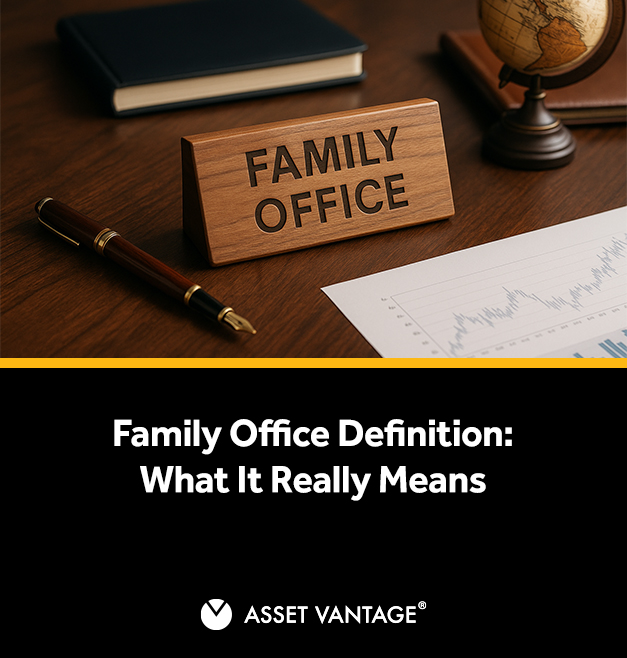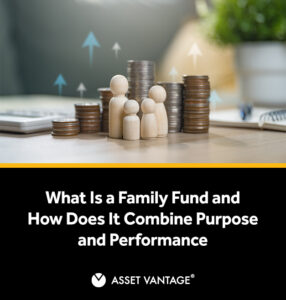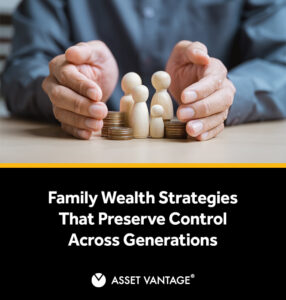Read Time13 Mins
Family Office Definition: What It Really Means
A family office is a central platform for managing family wealth and governance. It coordinates financial affairs, investment oversight, and selected personal services. Unlike a bank or law firm, it is not a licensed advisor. Instead, it is an operating model that unites tax experts, lawyers, and investment advisors within one framework. This integration streamlines services, reduces duplication, and improves communication for families.
At its core, a family office delivers:
- Investment oversight across asset classes, with performance tracked against family objectives.
- Wealth management discipline, ensuring expenses, reporting, and risks are controlled.
- Family governance support, clarifying roles, and guiding collective decisions.
- Education for younger family members, preparing them for financial stewardship.
The value lies in coordination. By aligning advisors, managers, and family members, a family office drives wealth preservation, tax planning, and governance toward continuity across generations.
History and Evolution of the Traditional Family Office
Family offices began in the 19th century as estate offices managing land, accounts, and staff for wealthy families. These early traditional family offices centralized one family’s wealth and affairs, focused on stewardship: preserving property, securing heirs, and keeping records accurate.
As wealth shifted from land to financial assets, the family office model expanded.
- Early 20th century: Oversight of securities, trusts, and family businesses.
- Post–World War II: Broader wealth management, tax planning, and philanthropy.
- Today: Coordination hubs that manage public markets, private equity, venture capital, and real estate, while also supporting governance and succession planning.
The purpose has stayed consistent: protect and grow family wealth while ensuring smooth intergenerational transfer.
The Term Family Office: Origins and Modern Meaning
Originally, “family office” described a single-family office (SFO) serving one wealthy household.
Today, the term covers several structures:
- Single-family office (SFO): Dedicated resources for one family, with full control and confidentiality.
- Multi-family office (MFO): Shared infrastructure and advisors serving more than one family, offering scale and cost efficiency. MFOs provide shared expertise by pooling knowledge and resources from serving multiple families, which enhances the quality of wealth management services.
- Outsourced family office: Coordination without a permanent in-house team, with licensed providers delivering legal, tax, and investment services.
Types of Family Office Explained
Not all family offices operate the same way. The right structure depends on family wealth, complexity of financial affairs, and governance needs. The three most common types of family offices are:
- Single-family offices (SFOs): Built for one family, usually ultra-wealthy families or those with large operating businesses. An SFO centralizes investment management, tax planning, and administration under one roof. Legal and tax services are delivered by licensed professionals, but the dedicated team ensures oversight and continuity.
- Multi-family office (MFO): Serves more than one family, sharing infrastructure, advisors, and reporting systems. MFOs coordinate wealth management, investment strategies, and family governance across multiple families. They provide scale and efficiency while maintaining access to top-tier investment advisors, asset managers, and specialists.
- Outsourced / Virtual family office: A growing model where families retain control of data and strategy but rely on external providers for services such as tax planning, property management, or succession planning. A virtual family office delivers personalized services with flexibility, without the cost of hiring a full-time in-house team.
Whether serving a single family or multiple families, these offices deliver customized solutions tailored to each family’s specific needs, risk tolerance, and long-term vision.
Single Family Office vs Multi Family Offices
A single-family office serves one family, giving maximum privacy and control. By contrast, many family offices today operate as multi-family platforms, offering professional depth and lower cost by pooling resources. Both structures provide wealth preservation and governance, but the trade-off is between exclusivity and efficiency.
Multi-Family Office Benefits
Multi-family offices provide:
- Investment oversight across asset classes with consolidated reporting.
- Wealth management solutions scaled for multiple families.
- Access to specialists in tax planning, charitable giving, and succession planning.
- Selected concierge services, such as lifestyle management or family education for younger family members.
The result is a balanced platform that is cost-effective, professionalized, and designed to support both family values and long-term continuity.
Outsourced Family Office Models
An outsourced family office allows families to coordinate financial affairs without building an in-house structure. Licensed investment advisors, lawyers, and CPAs provide the regulated work. The family office experts focus on integration:
- Aligning investment portfolios with family values
- Coordinating legal matters and tax planning
- Supporting governance, family meetings, and the education of younger family members
The virtual family office is a variation where the family retains ownership of sensitive data while services are delivered by experienced professionals on demand. This model is especially attractive for high-net-worth families seeking flexibility, confidentiality, and lower cost.
Services Offered by Family Offices
Family offices deliver a wide range of services that touch every aspect of wealth, governance, and family life. The table below summarizes the core service areas, what advisors typically do, and the benefits for families.
| Service Area | What Advisors Do | Benefit to Families |
| Investment Management | Design strategies, diversify across asset classes, and oversee direct and private investments | Align portfolios with goals, manage risk, and secure growth across generations |
| Wealth Management | Structure holdings, monitor spending, manage liquidity, and budgets | Ensure wealth preservation, efficiency, and control over the family’s assets |
| Tax Planning | Coordinate with CPAs on filings, cross-border compliance,and optimize capital gains | Minimize penalties, reduce tax drag, and support long-term tax efficiency |
| Legal Affairs | Manage trusts, estates, shareholder agreements, and governance compliance | Protect assets, reduce disputes, and enable smooth succession planning |
| Family Governance | Facilitate charters, family meetings, decision protocols, and education for younger members | Strengthen family unity, align values, and prepare future leaders |
| Succession Planning | Prepare heirs, plan leadership transition, coordinate ownership structures | Ensure continuity of family business and intergenerational wealth transfer |
| Philanthropy & Giving | Structure foundations, donor-advised funds (DAFs), trusts | Align giving with values, create impact, and capture tax advantages |
| Property Management | Oversee residences, commercial real estate, and vetted service providers | Maintain lifestyle quality, ensure privacy, and protect real estate investments |
| Lifestyle Management | Manage travel, wellness, education, and concierge services | Simplify daily life while safeguarding long-term continuity |
| Education & Training | Provide financial education to younger family members and stewardship training | Prepare heirs to manage financial and personal affairs responsibly |
| Administration & Reporting | Consolidate reporting, monitor cash flows, and maintain compliance records | Improve transparency, accountability, and decision-making efficiency |
Investment Management and Asset Classes
Family offices provide investment management by coordinating across multiple asset classes. Portfolios are executed through licensed investment advisors and external asset managers who bring professional oversight and due diligence.
Common allocations include:
- Public equity and fixed income
- Private equity, venture capital, and hedge funds
- Commercial real estate and direct investments
Diversification across these asset classes supports wealth preservation and aligns portfolios with family objectives.
Investment Strategies
Investment strategies in family offices are designed to reflect both financial objectives and family values. Portfolios are monitored by experienced investment advisors to balance growth, risk, and liquidity needs.
Key principles:
- Match risk appetite to long-term family wealth goals
- Incorporate succession planning and liquidity events
- Preserve capital for future generations while funding philanthropy or family business needs
Wealth Management and Preservation Approaches
Beyond investments, family offices deliver wealth management solutions that protect and grow assets across multiple generations. Family offices coordinate efforts to manage, protect, and transfer the family’s wealth across generations. Strategies integrate wealth management, family governance, and succession planning to ensure continuity.
Typical services provided include:
- Structuring holdings for tax efficiency and wealth preservation
- Monitoring spending and budgets for family members
- Designing governance models that align financial strategy with family values
This comprehensive approach supports both family unity and the family’s long-term legacy.
Tax Planning and Legal Affairs in Family Offices
Tax planning and legal matters are critical services offered by family offices. Licensed CPAs and legal counsel lead this work, while the family office coordinates to ensure compliance and efficiency.
Scope of services:
- Managing tax services across jurisdictions
- Coordinating cross-border structures for high-net-worth families
- Overseeing legal affairs related to trusts, estates, and family business ownership
By integrating advisors, the office reduces risk and supports compliant, tax-efficient wealth structures.
Property Management and Lifestyle Management
Many family offices also oversee property management and selected lifestyle management needs. This involves coordinating trusted service providers for residences, travel, and wellness, ensuring privacy and quality.
Examples include:
- Vetted property managers for residential and commercial holdings
- Concierge services for travel, education, and wellness
- Personalized services tailored to younger family members and their needs
These services show that the scope of a family office extends beyond finance, covering daily needs as well as continuity.
Family Governance, Legacy, and Wealth Preservation
Strong governance is the foundation of continuity. Family governance frameworks help ultra-high net worth and affluent families protect the family’s assets while maintaining family unity.
Family offices play a central role in protecting and passing down the family’s legacy, including values, traditions, and cultural heritage, through structured governance and intergenerational planning.
Unlike a private wealth management firm or a private bank, which focus narrowly on financial products, a family office integrates governance, wealth planning, and education to preserve wealth across generations.
Family Wealth Preservation
Family offices provide more than investment portfolio management. They coordinate asset management, oversee financial planning, and enforce disciplined spending policies that safeguard family wealth.
Services provided include:
- Designing wealth transfer planning strategies for multigenerational continuity
- Embedding liquidity rules that protect family members and future generations
- Applying structured risk management to governance and investments
Succession Planning for Future Generations
Succession planning protects both wealth and leadership. Done well, it prepares families to protect their business, their assets, and their legacy.
Focus areas include:
- Ownership transfers tailored to one family office or to multiple families
- Preparing younger family members for financial stewardship and leadership roles
- Coordinating structures for philanthropy, charitable giving, and tax-efficient legal matters
Family Education for Younger Family Members
Education bridges wealth and responsibility. Family offices provide family education that prepares heirs to manage both financial affairs and governance.
Core elements include:
- Basics of financial planning and wealth management
- Training on how investment advisors and asset managers oversee portfolios
- Embedding family values and long-term responsibility into governance
Family offices ensure that education and decision-making processes are aligned with the family’s values to preserve them across generations.
This equips heirs to manage both financial and personal affairs with confidence.
Family Legacy and Family Values
Legacy extends beyond wealth transfer. It reflects how families align their resources with mission and principles. Offices embed family values into governance, philanthropy, and education.
Examples include:
- Linking investments to the family’s legacy and long-term vision
- Coordinating charitable giving with governance and financial oversight
- Ensuring financial outcomes reflect agreed principles and family values
The Role of Family Meetings and Communication
Structured family meetings reinforce governance by aligning family members and creating transparency. Unlike reports from a private wealth management firm, these meetings integrate financial updates with education and governance.
Topics often covered include:
- Performance of investment portfolios and wealth management solutions
- Updates on tax planning, legal affairs, and compliance
- Dialogue on governance, education, and succession planning
Through consistent communication, families align expectations and strengthen family wealth preservation.
Direct Investments in Private Companies
Family offices often pursue direct investments in private companies and family-owned businesses. A dedicated team evaluates opportunities, seeking favorable entry points and the ability to influence governance. Unlike a private bank, which typically provides only financing, a family office aligns investments with financial planning and long-term objectives.
Direct investments also serve a strategic purpose:
- Support growth in sectors that align with family values or existing businesses
- Improve control over capital allocation and governance
- Create opportunities for wealth preservation and continuity across future generations
This model allows families to keep decision-making close while protecting both their businesses and their broader family affairs.
Family Offices Provide More Than Capital
Family offices provide far more than financial capital. They often contribute strategic input, governance oversight, and operational expertise. Family office experts and experienced professionals may join boards, connect management with networks, or advise on risk and compliance.
These are comprehensive services, extending beyond finance into areas that institutional investors rarely cover:
- Alignment of investments with succession planning and wealth transfer planning
- Consideration of personal affairs and the impact on family members
- Protecting the reputation and unity of families that operate through a family office.
By offering both governance and capital, family offices differentiate themselves from other investors and ensure investments serve both financial and legacy objectives.
Private Investments and Alternative Asset Classes
Beyond listed markets, families increasingly explore private investments across a range of asset classes. These include private credit, venture capital, hedge funds, and commercial real estate. Offices coordinate with specialist managers to diversify risk and align portfolios with family goals.
For other wealthy families and high-net-worth families, the motivation is clear:
- Broader diversification for wealth management and wealth planning
- Enhanced returns compared with traditional products from a private wealth management firm
- Integration with governance, philanthropy, and the family’s legacy
When managed carefully, private investments reinforce both wealth preservation and long-term continuity, balancing financial returns with the stability of personal affairs.
Managing Wealth and Legacy
Families with dedicated offices manage more than balance sheets. They focus on family wealth, governance, and alignment with family values across multiple generations. This includes not only investment oversight but also stewardship of financial affairs and even personal affairs.
For affluent families and other wealthy families, the family office acts as the platform that protects the family’s legacy. It ensures that family members benefit from disciplined family governance, structured oversight, and continuity. By linking wealth transfer planning, philanthropy, and education, families create a system that sustains both prosperity and purpose.
Charitable Giving and Philanthropy in Family Offices
Philanthropy is an essential part of legacy planning. Family offices provide structured approaches to charitable giving by coordinating with legal and tax advisors. Foundations, donor-advised funds (DAFs), and trusts are common services offered, with the office ensuring both compliance and impact.
Experienced professionals and a dedicated team support this process by:
- Embedding philanthropy into long-term tax planning and legal affairs
- Ensuring compliance with legal matters across jurisdictions
- Designing frameworks that reflect family values while promoting measurable outcomes
Governance and Family Unity Across Generations
Sustaining family unity requires more than wealth. Strong family governance integrates the family business, investment oversight, and structured decision-making. Regular family meetings provide a forum for reporting and dialogue among family members.
High net worth families and affluent families often rely on governance to:
- Balance ownership interests in the family business
- Guide succession planning and next-generation readiness
- Oversee both family affairs and personal affairs to reduce conflict
The outcome is resilience. With clear governance, families with offices achieve wealth preservation, protect the family’s legacy, and ensure continuity for future generations.
Private Wealth Management Firm vs Family Office
A private wealth management firm offers investment products and financial advice. A family office, by contrast, provides comprehensive services that coordinate financial affairs, governance, and administration. This includes concierge services, personalized services, and oversight of the family’s investments, while licensed professionals handle tax planning and legal affairs.
Family offices provide what firms cannot:
- Integration of wealth management solutions with governance and reporting
- Oversight of the family’s assets, including both financial and non-financial holdings, and personal affairs beyond portfolios, to ensure comprehensive management
- Access to family office experts and experienced professionals who ensure alignment with family values
The distinction is clear. A family office is defined by scope and integration, not just by assets under management. And not all family offices operate alike. The model depends on complexity, governance needs, and family objectives.
Family Business Integration with Family Offices
For wealthy families and high-net-worth families, the family business often represents the largest pool of capital and risk. Integrating that business with the family office strengthens oversight and ensures succession planning.
Services provided include:
- Coordinating cash-flow planning and tax planning with corporate advisors
- Managing ownership transfers, drafting shareholder agreements, restructuring estate vehicles, and ensuring compliance with corporate governance rules
- Supporting family members and younger family members in preparing for leadership roles
A family office preserves both capital and continuity, aligning the family’s legacy with long-term operations. For affluent families, this integration reduces risk and sustains family unity across generations.
Role of Investment Advisors and Asset Managers
Investment advisors and asset managers are central to family office operations. They design and monitor investment portfolios, balancing risk and return across multiple asset classes.
Key areas of support:
- Structuring investment strategies to align with family goals
- Overseeing direct investments, private investments, and commercial real estate allocations
- Applying disciplined risk management to protect capital
- Delivering services offered by registered professionals under the guidance of the office
A dedicated team of experienced professionals ensures that governance, oversight, and reporting are tied to outcomes. By integrating expertise, family offices provide investment oversight that goes beyond markets and secures wealth for future generations.
Family Office Experts and Experienced Professionals
Effective family offices rely on family office experts and experienced professionals. These include tax advisors, lawyers, and registered investment advisors who guide decisions across complex structures. Their role is not to replace regulated providers of asset management or legal services but to coordinate them within a centralized governance framework.
For ultra-high net worth and affluent families, the advantage is clear: oversight stays aligned with governance, reporting, and family values. By keeping advisors coordinated, the office ensures continuity across financial affairs and long-term planning.
Comprehensive Services Provided by Family Offices
Family offices provide comprehensive services that include:
- Investment oversight and disciplined investment portfolio management
- Administration, consolidated reporting, and support for family members
- Wealth planning, education for younger family members, and succession design
- Charitable giving, philanthropy, and structuring for compliance
- Coordination of tax planning and legal matters with licensed professionals
Unlike a private bank, which primarily delivers financial products, a family office integrates governance, education, and legacy-building into its daily operations. This breadth explains why families view the office as essential to continuity.
Not All Family Offices Are the Same
There is no single model that defines a family office. What works for one family office may not suit another. A traditional family office may serve a single wealthy household, while single-family offices and multi-family offices scale differently depending on needs.
Others adopt an outsourced family office model, retaining ownership of data while coordinating with external specialists. The scope varies: some keep governance, reporting, and education in-house, while others rely on external experienced professionals for structuring and compliance.
The takeaway is clear. Not all family offices are the same. Each reflects the unique mix of governance, risk oversight, and services required to protect family wealth for future generations.
The role of family offices continues to expand. As regulations tighten, asset classes diversify, and generations shift, offices will serve as the platform where wealth, governance, and family values converge. Unlike banks or advisors, the family office is defined by integration. For families seeking continuity, it remains the model that secures both prosperity and purpose for the next century.







